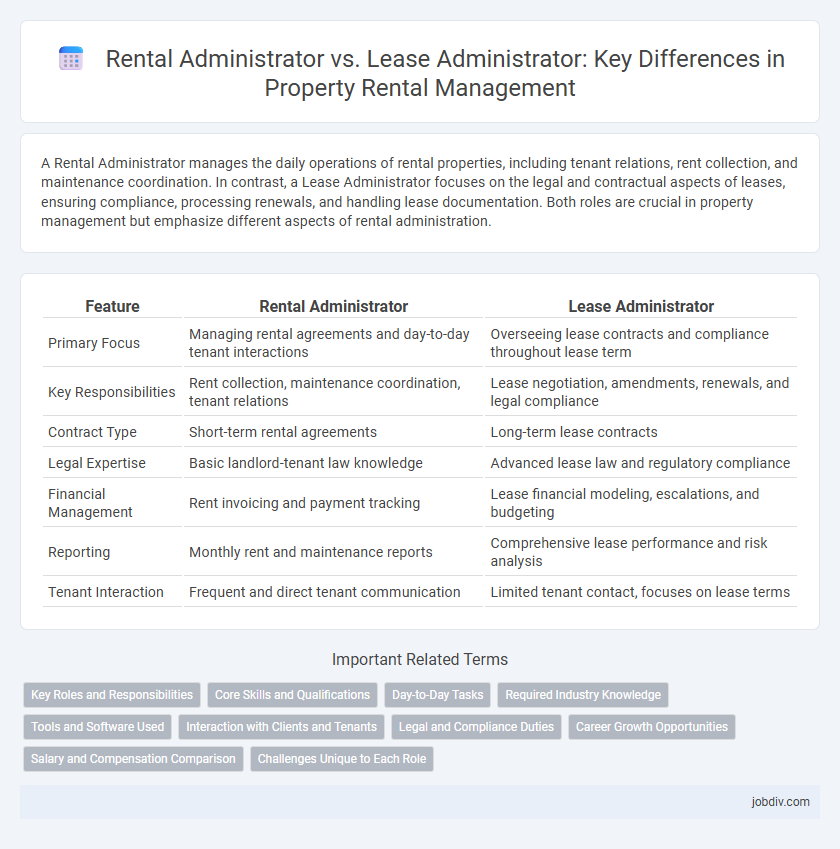A Rental Administrator manages the daily operations of rental properties, including tenant relations, rent collection, and maintenance coordination. In contrast, a Lease Administrator focuses on the legal and contractual aspects of leases, ensuring compliance, processing renewals, and handling lease documentation. Both roles are crucial in property management but emphasize different aspects of rental administration.
Table of Comparison
| Feature | Rental Administrator | Lease Administrator |
|---|---|---|
| Primary Focus | Managing rental agreements and day-to-day tenant interactions | Overseeing lease contracts and compliance throughout lease term |
| Key Responsibilities | Rent collection, maintenance coordination, tenant relations | Lease negotiation, amendments, renewals, and legal compliance |
| Contract Type | Short-term rental agreements | Long-term lease contracts |
| Legal Expertise | Basic landlord-tenant law knowledge | Advanced lease law and regulatory compliance |
| Financial Management | Rent invoicing and payment tracking | Lease financial modeling, escalations, and budgeting |
| Reporting | Monthly rent and maintenance reports | Comprehensive lease performance and risk analysis |
| Tenant Interaction | Frequent and direct tenant communication | Limited tenant contact, focuses on lease terms |
Key Roles and Responsibilities
Rental Administrators primarily manage tenant communications, rent collection, and maintenance coordination to ensure smooth property operations. Lease Administrators focus on the preparation, execution, and compliance of lease agreements, tracking critical lease dates and terms. Both roles collaborate to optimize property performance, but Rental Administrators emphasize operational tasks while Lease Administrators concentrate on contract management and legal compliance.
Core Skills and Qualifications
Rental Administrators excel in tenant relations, property maintenance coordination, and rent collection, requiring strong communication and organizational skills combined with knowledge of rental property laws. Lease Administrators specialize in managing lease agreements, contract compliance, and financial reporting, demanding expertise in legal documentation, negotiation, and data analysis. Both roles require proficiency in property management software and a solid understanding of real estate regulations.
Day-to-Day Tasks
Rental administrators oversee property maintenance schedules, rent collection, and tenant communications to ensure smooth daily operations. Lease administrators focus on managing lease agreements, tracking renewal dates, and coordinating documentation to maintain compliance. Both roles require detailed record-keeping and proactive problem-solving to support property management efficiency.
Required Industry Knowledge
Rental Administrators require comprehensive knowledge of property management, tenant relations, and rental market trends to efficiently oversee leasing processes and maintain occupancy rates. Lease Administrators must possess detailed expertise in contract law, lease agreements, and compliance regulations to manage lease documentation and ensure legal adherence. Both roles demand strong understanding of industry-specific software and financial reporting to support operational and legal responsibilities.
Tools and Software Used
Rental administrators primarily utilize property management software such as Yardi, AppFolio, and Buildium to streamline rent collection, tenant communication, and maintenance tracking. Lease administrators focus on lease management platforms like LeaseQuery, Visual Lease, and CoStar to ensure compliance, monitor lease terms, and manage critical dates. Both roles increasingly adopt integrated cloud-based solutions to enhance efficiency and data accuracy in rental and lease administration.
Interaction with Clients and Tenants
Rental administrators primarily manage lease agreements and ensure timely communication with tenants regarding rent payments and property issues, fostering strong tenant relationships. Lease administrators handle contract specifics and legal compliance, often interacting with clients to negotiate lease terms and renewals to align with business objectives. Both roles require effective communication skills, but rental administrators focus more on daily tenant interactions, while lease administrators engage clients in strategic lease management.
Legal and Compliance Duties
Rental Administrator oversees tenant agreements and rent collections while ensuring compliance with local housing laws and municipal regulations. Lease Administrator specializes in managing lease documentation, tracking critical deadlines, and enforcing lease terms in accordance with state and federal real estate laws. Both roles require expertise in legal compliance to mitigate risks associated with property rental and lease management.
Career Growth Opportunities
Rental administrators manage property rentals by coordinating tenant communications, processing payments, and ensuring compliance with rental agreements, offering career growth through expanding responsibilities in property management. Lease administrators focus on drafting, negotiating, and maintaining lease contracts, with career advancement opportunities in legal compliance and contract management within real estate firms. Both roles provide pathways to senior management positions, such as property manager or real estate portfolio manager, by developing specialized skills in rental operations or lease administration.
Salary and Compensation Comparison
Rental Administrators typically earn a median salary of $52,000 annually, focusing on managing rental agreements, rent collection, and tenant relations. Lease Administrators command a higher average compensation near $68,000 per year due to their specialized role in overseeing complex lease documentation, compliance, and corporate lease management. Salary differences reflect the distinct responsibilities, with Lease Administrators often receiving additional bonuses or benefits tied to lease portfolio performance.
Challenges Unique to Each Role
Rental Administrators often struggle with managing day-to-day tenant communications and timely rent collection, requiring strong organizational skills to handle varied rental agreements and maintenance requests. Lease Administrators face challenges related to contract compliance, detailed lease document management, and tracking key dates for renewals or expirations, demanding expertise in legal and regulatory frameworks. Both roles require precise data management, but Rental Administrators focus more on operational efficiency, while Lease Administrators prioritize contractual accuracy and risk mitigation.
Rental Administrator vs Lease Administrator Infographic

 jobdiv.com
jobdiv.com